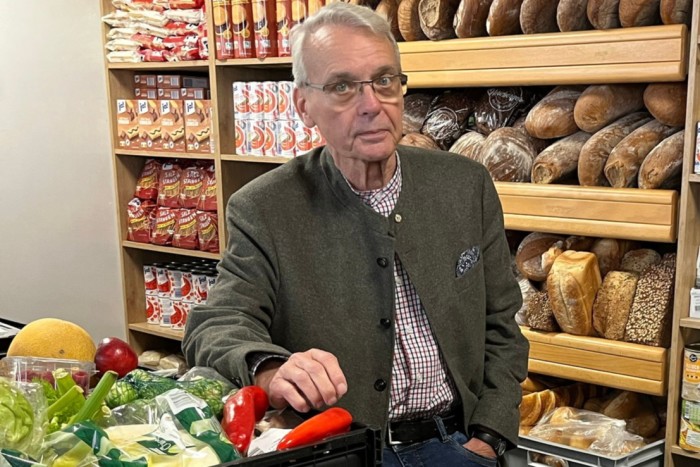With no job and talking little of the language, Olena Vinykova has relied on her native meals financial institution to deal with the “very arduous” scenario she finds herself in since fleeing Ukraine for Germany seven months in the past. If she had arrived any later, her scenario may have been even worse.
Surging meals and gasoline costs imply hundreds of thousands extra individuals in Germany are struggling to make ends meet, forcing many meals banks to close their doorways to 1000’s of recent candidates. That features the one utilized by Vinykova in Friedberg, about 15 miles north of Frankfurt.
The previous nurse, who left her husband and grown-up kids in Bakhmut, now on the entrance line of Ukraine’s battle with Russia, requested the Monetary Occasions to “say thanks” to the volunteers for his or her “superb” work.
Throughout Europe meals financial institution use is hovering as the best inflation for a technology hits the area’s poorest, who spend a higher proportion of their earnings on power and meals, hardest.
Charities from Spain to Latvia report 20 to 30 per cent larger demand than final 12 months and anticipate an additional improve this winter. In Bulgaria, one of many poorest nations within the EU, there was a three-quarters leap between September and October in individuals utilizing the nationwide meals financial institution, in accordance with the nation’s meals financial institution director Tzanka Milanova. “Inflation is gnawing away at individuals’s funds,” stated Milanova. “Extra individuals find yourself beneath the poverty line.” Authorities our bodies have exhausted their budgets for meals support, forcing Bulgarian charities to show to meals banks.
Over a 3rd of Germany’s 962 meals banks — known as Tafel — have stopped taking new candidates past the 2mn they already assist. It’s the first time many have taken such a drastic step, after demand rose greater than 50 per cent this 12 months for entry to the fruit, greens, bread and different necessities they accumulate from retailers and donors.
“We may double the variety of prospects if we took everybody who asks,” stated Peter Radl, chair of the Friedberg meals financial institution, which offers a basket of provides each two weeks to 700 households, of which about 130 come from Ukraine. “However area is restricted, we’ve got a complete of 120 baskets, and there may be solely a lot our volunteers can do,” he added.
“It’s stunning for a wealthy nation like Germany to have so many individuals who can’t afford to feed themselves correctly,” stated Katja Bernhard, a board member of the meals financial institution affiliation for the Hesse area.
But hovering power costs, triggered by Russia’s invasion of Ukraine, have pushed over 1 / 4 of the German inhabitants into “gasoline poverty” — outlined as spending greater than 10 per cent of earnings on power — up from 14.5 per cent final 12 months, in accordance with the nation’s council of financial consultants.
Greater than a fifth of the EU inhabitants was already unable to warmth their residence sufficiently final 12 months, earlier than the newest worth surge, in accordance with the newest information from Eurostat, the EU statistics company.
In November, eurozone worth development slowed for the primary time in 17 months, dipping from 10.6 per cent to 10 per cent. However this was little comfort for individuals struggling to make ends meet, particularly when common wages have risen solely 4 per cent previously 12 months.

Power costs throughout the only forex space are nonetheless nearly 35 per cent larger than a 12 months in the past, whereas meals, alcohol and tobacco price greater than 13 per cent additional, in accordance with Eurostat.
The worth of some necessities has risen even quicker. Within the wider EU, milk costs have soared 43 per cent previously 12 months, whereas pork prices 55 per cent extra and Japonica rice 68 per cent extra.
In central and japanese Europe, the price of staples has elevated much more sharply. In Hungary, bread costs have risen by 80 per cent over the previous 12 months. There, the nationwide meals financial institution works through a community of charitable teams, which has expanded by nearly 1 / 4 to 530 this 12 months. Its spokesman András Nagygyörgy estimates it helps 221,000 individuals, including: “Because the begin of the inflationary spiral, we’ve got been witnessing an influx of organisations.”
Giovanni Bruno, president of the Italian meals financial institution basis, estimated an extra 85,000 individuals had sought its assist this 12 months. “Many individuals who ask for meals at the moment are younger, even college students attempting to save cash to pay electrical energy or heating payments,” he stated.
Inflation has additionally led to a fall within the quantity of meals and cash donated in a number of EU nations in latest months. Volunteers and administrators in meals banks throughout Europe say supermarkets have turn into extra aggressive in discounting meals nearing its sell-by date, leaving much less for meals banks to gather.
Oscarine Vonk, a volunteer on the Amsterdam meals financial institution community, stated it had benefited from a marketing campaign interesting for wealthier individuals to donate the €190 the federal government is giving to all Dutch households to assist with excessive power payments in November and December. “We actually battle to gather sufficient meals, however we will use this cash to purchase extra if wanted,” she stated.
Dutch meals banks responded to the surge in inflation by growing the restrict on disposable earnings individuals can must qualify as members to €300 monthly and Vonk stated they anticipated a 20 per cent rise in demand this winter.
“Groceries and electrical energy are far more costly,” stated Adnan Ibrahim, who has been going together with his spouse to a meals financial institution in southern Amsterdam for 3 years. “I’ve well being issues — my spouse too. I can’t work and we don’t find the money for to pay the payments.”



